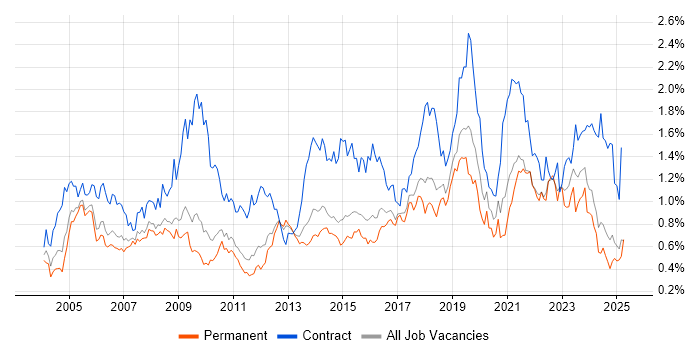Data Analyst
England > East of England
The median Data Analyst salary in the East of England is £40,000 per year, according to job vacancies posted during the 6 months leading to 10 February 2026.
The table below compares current salary benchmarking and summary statistics with the previous two years.
| 6 months to 10 Feb 2026 |
Same period 2025 | Same period 2024 | |
|---|---|---|---|
| Rank | 107 | 159 | 158 |
| Rank change year-on-year | +52 | -1 | +14 |
| Permanent jobs requiring a Data Analyst | 47 | 16 | 37 |
| As % of all permanent jobs in the East of England | 1.02% | 0.47% | 0.83% |
| As % of the Job Titles category | 1.14% | 0.53% | 0.88% |
| Number of salaries quoted | 13 | 8 | 33 |
| 10th Percentile | - | £36,250 | £27,350 |
| 25th Percentile | £35,000 | £38,875 | £35,500 |
| Median annual salary (50th Percentile) | £40,000 | £45,171 | £42,500 |
| Median % change year-on-year | -11.45% | +6.28% | -15.00% |
| 75th Percentile | £53,750 | £54,375 | £50,000 |
| 90th Percentile | £58,750 | £62,250 | £58,000 |
| England median annual salary | £40,000 | £47,500 | £47,500 |
| % change year-on-year | -15.79% | - | -5.00% |
All Permanent IT Job Roles
East of England
For comparison with the information above, the following table provides summary statistics for all permanent IT job vacancies in the East of England. Most job vacancies include a discernible job title that can be normalized. As such, the figures in the second row provide an indication of the number of permanent jobs in our overall sample.
| Permanent vacancies in the East of England with a recognized job title | 4,107 | 2,994 | 4,184 |
| % of permanent jobs with a recognized job title | 89.36% | 88.84% | 94.34% |
| Number of salaries quoted | 2,531 | 1,371 | 3,358 |
| 10th Percentile | £28,000 | £28,000 | £26,000 |
| 25th Percentile | £35,250 | £39,125 | £32,750 |
| Median annual salary (50th Percentile) | £50,000 | £54,000 | £50,000 |
| Median % change year-on-year | -7.41% | +8.00% | -4.76% |
| 75th Percentile | £65,000 | £66,296 | £65,000 |
| 90th Percentile | £80,000 | £78,750 | £80,000 |
| England median annual salary | £55,000 | £60,000 | £55,000 |
| % change year-on-year | -8.33% | +9.09% | -11.29% |
Data Analyst
Job Vacancy Trend in the East of England
Historical trend showing the proportion of permanent IT job postings featuring 'Data Analyst' in the job title relative to all permanent IT jobs advertised in the East of England.

Data Analyst
Salary Trend in the East of England
Salary distribution trend for Data Analyst job vacancies in the East of England.

Data Analyst
Salary Histogram in the East of England
Salary distribution for jobs citing Data Analyst in the East of England over the 6 months to 10 February 2026.
Data Analyst
Job Locations in the East of England
The table below looks at the demand and provides a guide to the median salaries quoted in IT jobs citing Data Analyst within the East of England region over the 6 months to 10 February 2026. The 'Rank Change' column provides an indication of the change in demand within each location based on the same 6 month period last year.
| Location | Rank Change on Same Period Last Year |
Matching Permanent IT Job Ads |
Median Salary Past 6 Months |
Median Salary % Change on Same Period Last Year |
Live Jobs |
|---|---|---|---|---|---|
| Cambridgeshire | - | 16 | £40,000 | - | 8 |
| Essex | +4 | 10 | £52,500 | +26.51% | 2 |
| Norfolk | +12 | 8 | - | - | 2 |
| Suffolk | +10 | 8 | - | - | 3 |
| Bedfordshire | - | 5 | £40,000 | - | 2 |
| Data Analyst England |
|||||
Data Analyst Skill Set
Top 30 Co-Occurring Skills & Capabilities in the East of England
For the 6 months to 10 February 2026, Data Analyst job roles required the following skills and capabilities in order of popularity. The figures indicate the absolute number of co-occurrences and as a proportion of all permanent job ads across the East of England region featuring Data Analyst in the job title.
|
|
Data Analyst Skill Set
Co-Occurring Skills & Capabilities in the East of England by Category
The following tables expand on the one above by listing co-occurrences grouped by category. They cover the same employment type, locality and period, with up to 20 co-occurrences shown in each category:
